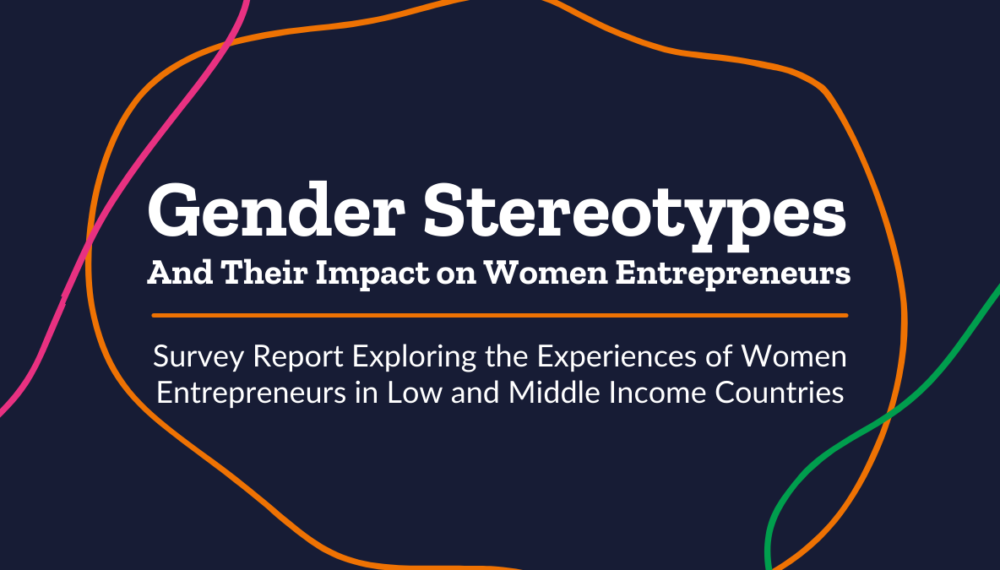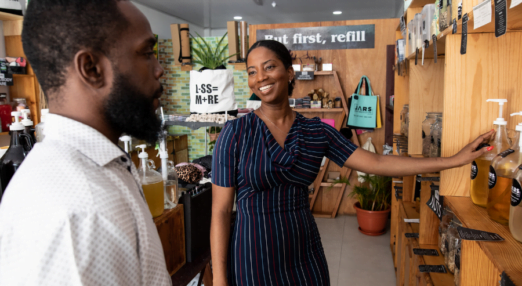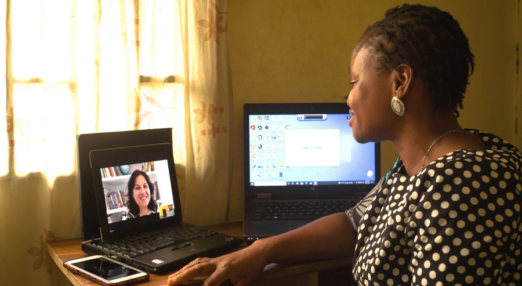Our report reveals that gender stereotypes undermine women’s entrepreneurship
Our Senior Advocacy Advisor, Sini Maria Heikkila, outlines the impact of gender stereotypes on women's entrepreneurship.

This article was originally written for and published by FinEquity.
It’s currently estimated that it will take 268 years to close the economic gap between women and men. One of the root causes fuelling gender inequality is gender stereotypes – generalised views or preconceptions about the characteristics or roles that are expected to be possessed by, and socially performed by, women and men – which affect all areas of public and private life, including entrepreneurship and economic participation. Gender stereotypes are understood to be codified gender norms – the collective expectations of how a person must behave based on their gender.
Throughout our years working with women entrepreneurs in low- and middle-income countries (LMICs), the Cherie Blair Foundation for Women has heard from women entrepreneurs about the negative impact of gender stereotypes on their lives and businesses. For instance, our annual audit report published in March 2021 (based on survey responses from 125 women entrepreneurs in 32 LMICs) provided some initial information about the deep-rooted ways gender stereotypes affect women entrepreneurs. For instance, over half (57%) of respondents were challenged by family members with the stereotype that “men do not like women who are too strong / business-minded / successful.” Just over 53 % had experienced the stereotype that “women should prioritise domestic duties such as caring for their children.”
Given the prevalence and impact of gender stereotypes on entrepreneurship – when, where and by whom entrepreneurship happens – it is concerning that there has been very little attention on how gender stereotypes and social norms affect entrepreneurship and economic participation. CGAP and FinEquity’s work to address social norms in financial inclusion of women is important to note here, but beyond that there has been very little research or policy attention on the issue. It was clear to us that the issue of gender stereotypes as a root cause undermining economic equality between women and men has not received the serious attention it requires, so we set out to address this gap.
I was made to believe that entrepreneurship for women is a hobby, not a serious business. Something that I can do to pass time whilst not compromising my maternal responsibility.
Gender stereotypes significantly shape women’s journeys to and through entrepreneurship
The Foundation undertook some initial research on how gender stereotypes affect and shape the lives and business of women entrepreneurs in LMICs, the result of which was the “Gender Stereotypes and their Impact on Women Entrepreneurs Survey Report exploring the Experiences of Women Entrepreneurs” report published at the Women Entrepreneurs Mean Business summit in November 2021. The survey results are based on responses from over 200 women entrepreneurs across 42 countries. The report finds that gender stereotypes significantly shape women’s journeys to and through entrepreneurship by affecting their aspirations, sources of support, opportunities, access to resources, perceptions and the wider entrepreneurial ecosystem in multiple ways.
The findings reveal that whilst the impact and experiences of gender stereotypes are not monolithic, gender stereotypes do affect most women entrepreneurs in number of ways. Gender stereotypes are part of the everyday lives of many women – 96% of the women entrepreneurs in the survey reported that they had experienced or heard gender stereotypes in their life. Overall, 70% said that gender stereotypes have negatively affected their work as an entrepreneur.
The impact on women’s opportunities as entrepreneurs is significant. Some 63% of survey respondents believe that gender stereotypes affect how seriously they are taken as business owners. For instance, one woman entrepreneur from India explained that “I was made to believe that entrepreneurship for women is a hobby, not a serious business. Something that I can do to pass time whilst not compromising my maternal responsibility.”
Nearly a quarter of the women entrepreneurs had experienced gender stereotypes or discriminatory remarks while trying to access finance for their business. As an Indonesian entrepreneur mentioned, “My friend who acted as an angel investor was telling me that he had doubt about investing in women founders because women are usually not good at managing business.” This highlights how gender stereotypes shape the perceptions of actors in the financial and entrepreneurial ecosystem and create an inequitable system.
Given this background, it is unsurprising that 61% of respondents believe that gender stereotypes impact their business growth. Besides this, over half (55%) of the women surveyed felt that institutions relevant for entrepreneurs in their countries are biased in favor of men.
Gender stereotypes affect most women with whom I work. We cannot achieve gender equality in entrepreneurship and economic justice if we do not dismantle gender stereotypes.
Given our findings, what’s next?
The quote from the COO of WISE Vietnam, the Foundation’s partner in Vietnam captures well the urgency and fundamental need to tackle gender stereotypes.
Evidently, dismantling gender stereotypes in entrepreneurship requires long-term commitment and hard work across multiple segments of the entrepreneurial ecosystem. Our survey report is just the first step of the Foundation’s work in this area, and we are currently preparing plans for next step in policy research and our engagement with the Commission on the Status of Women, which provides a critical opportunity to explore the topic further.
Our report provides a comprehensive set of recommendations that can be adopted by the private sector, multilateral agencies, civil society and governments alike.
- The work to tackle gender stereotypes must start with individuals. This could mean increasing self-awareness of our own biases, values and gender (among other) stereotypes and how these influence our actions and increasing understanding of the ways gender stereotypes shape women’s lives.
- We need to raise awareness about gender stereotypes – particularly how they shape the realisation of rights and equal opportunities for women. We need more targeted awareness raising campaigns and programmes to eliminate gender stereotypes.
- We need to design and promote programs that support women entrepreneurs in their journey and mitigate the challenges they face that are rooted in gender stereotypes. These initiatives can include mentoring and trainings programmes – such as those facilitated by the Foundation – which increase business skills and strengthen women’s leadership skills and confidence.
FinEquity members can use their vibrant community for learning and exchange of best practices and challenges in addressing gender stereotypes in financial inclusion, and to adapt successful models and approaches in their work. We don’t want to wait 268 years for economic equality, and to achieve this goal, more sustained attention and resources are required to tackle gender stereotypes.
*WISE Vietnam partnered with the Cherie Blair Foundation for Women to deliver the Women Entrepreneurs Amplifying Ventures and Economies (WEAVE) programme in 2020 and 2021 and used digital technology to support, empower and bring entrepreneurship skills to 8320 women running small and growing businesses in Vietnam.
Read our report on the impact of gender stereotypes on women entrepreneurs now.
This report details analysis of online survey data from 221 women entrepreneurs in 42 low and middle income countries, gathered in July and August 2021.

Discover more blogs:
-

Women’s MSMEs boost economies and promote sustainability
Our CEO, Dhivya O'Connor, shares why women's Micro, Small, and Medium-sized Enterprises (MSMEs) are crucial for global prosperity.
Read more
-

Get to know our CEO: a letter from Dhivya O’Connor
Two months into her role as CEO, Dhivya O'Connor shares her experience and what we can expect from the Foundation under her leadership.
Read more
-

In celebration of the power of mentoring
Efe Olokpa shares her insight on our Mentoring Women in Business programme.
Read more
